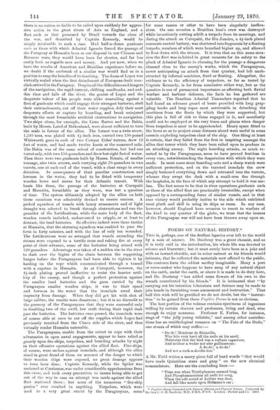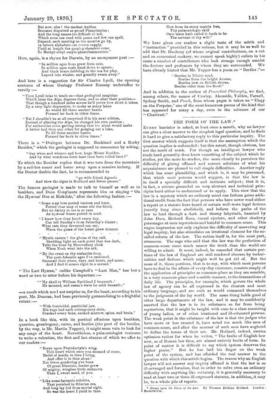POEMS ON NATURAL HISTORY.* Tuts is, perhaps, one of the
drollest legacies ever left to the world by a man of science. Dr. Daubeny was a great chemist, and as it is truly said in the introduction, his whole life was devoted to science and literature ; but it must surely have been as a joke and with an inward chuckle, not in sober earnest as his friends would intimate, that he collected the materials now offered to the public. The contents form the oddest medley imaginable. Many a poet or verse-maker who happens to have sung of any natural object on the earth, under the earth, or above it is made to do duty here, and Dr. Daubeny "has added some flowers of his own to the wreath contributed by his friends." It is intimated that "by carrying out his intention Literature and Science may be made to join hands in furnishing some amusement and instruction." That half this wish will be gratified we do not doubt, but the "instruc- tion" to be gained from these Fugitive Poems is not so obvious.
The best portion of the volume contains specimens of ingenious trifling by certain doctors and professors, living and dead, wise enough to enjoy nonsense. Professor E. Forbes, for instance, sings of "the jolly young trilobite," and among other contribu- tions has an ornithological romance on "The Fate of the Dodo," one stanza of which may suffice:—
" Do-do! Monsieur de Blainville, Who hits very hard all the nails on his anvil, Maintains that the bird was a vulture rapacious, And neither a wader nor else gallinaceous:
A do-do ! a do-do !
And not a cock-a-doodle-doo."
A Mr. Field writes a merry piece full of hard words "that would have made Quintilian stare and gasp" on the new chemical nomenclature. Here are the concluding lines :—
"Time was when Triethylamine seemed long, And Phosphammonium all unfit for song, When the soft sound of Aniline was dear, And fell like music upon Hofmann's ear ; • Fugitive Poems Connected with Natural History and Physical Science. Collected by the late C. G. B. Daubeoy, M.D., F.R.S., F.O.S. London: Parker and Co. 1569.
But now, alas ! the modest Aniline Becomes disguised as proud Phenylamine; And the long names too difficult to tell, Which none can read with peace and few can spell, Expand, each meeting as the months go by, In letters alphabets can scarce supply, Until at length the gasping chemists come To Methyl-ethyl-amylo-phenylammonium."
Here, again, is a rhyme for Darwin, by an anonymous poet :—
"In million ages lions grew from cats, In million ages seals fined down to sprats ; And black bears dabbling in the sea for play, Lapsed into whales, and grandly swam away."
And here is a suggestion for Sir Charles Lyell, the opening sentence of whose Geology Professor Ramsay undertakes to versify :-
"Then Lyell trios to teach us—that geological magician
Who'll raise the Alps, depress them, and so alter their position— That though a hundred miles across he'll prove how short it takes, By a very light depression, to make as many lakes As would fill these ancient basins Formed far back in olden times.
"Yet I shouldn't be at all surprised if in his next edition, Instead of altering the Alps, he changed his own position ; For authorities seem getting strong that ice alone would make A better tool than any other for gouging out a lake,
To fill these ancient basins Formed far back in olden times."
There is a "Dialogue between Dr. Buckland and a Rocky Boulder," which the geologist is supposed to commence by asking,
"Say when and whence and how, huge Mister Boulder, And by what wondrous force hast thou been rolled here ?"
To which the Boulder replies that it was torn from the mountain by a red-hot comet and borne away upon a massive iceberg. If the Doctor doubts the fact, he is recommended to
"go with friend Agassiz And view the signs in Scotland and Swiss passes."
The famous geologist is made to talk to himself as well as to boulders, and Dean Conybeare represents him as singing "On the Hymnas' Den at Kirkdale," after the following fashion :—
"Some may love potted venison and hare,
Potted char may of some stir the blood, But no dainty to me is so rare As hymnals' bones potted in mud.
"I know how they fared every day, Can tell Sunday's from Saturday's dinner ; What rats they devoured can say, When the game of the forest grew thinner.
"Mystic cavern ! the gloom of thy cell, Shedding light on each point that was dark, Tells the hour by Shrewsbury clock When Noah went into the ark.
"By the crust on thy stalactite floor, The post-Adamite ages I've reckoned, Summed their years, days, and hours, and more, And I find it comes right to a second."
"The Last Hyena," unlike Campbell's "Last Man," has but a word or two to utter before his departure :—
"'My skull to William Buckland I bequeath :'
He moaned, and ocean's wave he sank beneath ;"
result which need not surprise us, for the beast, according to his poet, Mr. Duncan, had been previously gormandizing to a frightful extent :— "With fratricidal, parricidal jaw,
His rage had each cotemporary slain,
Cracked every bone, sucked marrow, spine, and brain."
In a book like this, with its poetical effusions upon boulders, quarries, granitogony, ozone, and beetles (the poet of the beetles, by the way, is Mr. Martin Tupper), it might seem vain to look for any songs of the heart. Nevertheless, a palmontologist ventures to write a valentine, the first and last stanzas of which we offer to our readers :—
"Borne upon Pterodaetyle's wing,
This heart which once you deemed of stone, Model of maids, to thee I bring, And offer it to thee alone !
Not Owen pondering o'er bone Of great Dinornis, fonder grew Of mighty, wingless birds unknown Than I, sweet maid, of you.
"Like some fantastic trilobite, That perished in Silurian sea, And long lay hid from mortal sight, So was the heart I yield to thee.
Now from its stony matrix free, Thy palreontologic skill Once more bath called it forth to be The servant of thy will."
We have given our readers a slight taste of the mirth and " instruction " provided in this volume, but it may be as well to add that Dr. Daubeny (of whose original contributions, on a cat
and on economical cookery, we cannot speak highly) enlists in his cause a number of contributors who look strange enough amidst the doctors and professors by whom they are surrounded. We have already hinted that Mr. Tupper has a poem on "Beetles :"—
" Beetles in Nilotic mud,
Beetles from the bright Azores, Beetles new on British shores, Beetles older than the flood."
And in addition to the author of Proverbial Philosophy, we find, among others, the names of Cowley, Akenside, Yalden, Parnell, Sydney Smith, and Pouch, from whose pages is taken an "Elegy on the Porpoise," one of the most humorous poems of the kind that has appeared for many a day, even in the columns of our " Charivari."



































 Previous page
Previous page